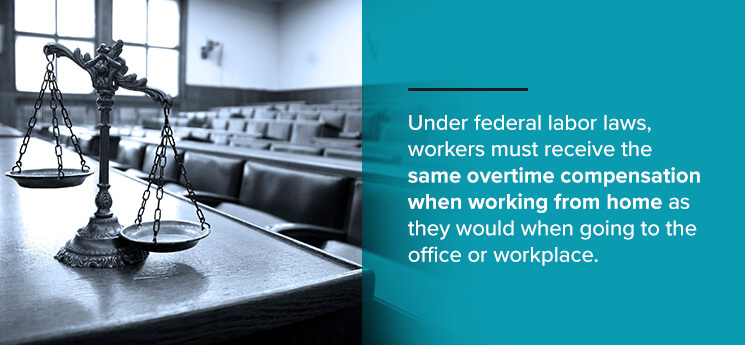By Weisberg Cummings, P.C. on November 1st, 2021
The COVID-19 pandemic has changed the way many Americans work. A recent study conducted by the Pew Research Center indicates 71% of employed individuals are now working from home, compared to only 20% before the coronavirus outbreak.
Are you one of the millions who are now working from a home office? Have you found you are logging more hours than you are getting paid for? You are not alone. According to an ADP Research Institute study released in April 2021, approximately 10% of employees say they are putting in more than 20 hours of free work per week.
Why Is Unpaid Overtime on the Rise?
Several factors contribute to the lack of compensation for extra work. In some cases, employees must pick up the slack caused by co-workers leaving their jobs because of the pandemic. In other situations, companies have landed more work, placing an additional burden on their current labor force.
The upshot is that remote employees may feel more pressure to put in the extra time to keep up with the workload. The lack of direct supervision can also contribute to inefficient hour tracking. Hence, many are working lots of overtime without receiving appropriate compensation for their efforts.
Who Is Exempt and Not Exempt From FLSA Overtime Requirements?
The Fair Labor Standards Act (FLSA) is the federal labor law covering various employee compensation issues, including when workers must get overtime pay and how much they should receive. The FLSA places employees into two categories:
- Exempt workers: These individuals are typically salaried employees who receive the same compensation regardless of how many hours they put in per week. They are not eligible for overtime compensation.
- Nonexempt workers: These employees receive an hourly wage and work 40 hours per week. The hourly rate increases if they go over 40 hours.
Exempt employees are not entitled to overtime pay unless their salary does not exceed the threshold amount — $780 per week in Pennsylvania as of 2021, aligning with the federal requirement — and they work more than 40 hours per week. The nature of the job duties can also affect overtime eligibility. Examples of workers who fall into the exempt category include elementary and secondary elementary school teachers, executives, farmworkers, railroad employees and taxi drivers.
If you are a nonexempt employee, overtime pay begins when reaching 40 hours in a workweek. The mandated rate is at least 1 1/2 times the hourly wage. For example, if a worker’s hourly rate is $20 per hour and they put in a 50-hour week, their earnings would be $1,100. The breakdown would be $800 in regular wages and $300 in overtime pay.
State-specific laws, the payment of bonuses and other factors can impact overtime eligibility and payment amounts. Whether a worker meets the classification requirements for a “highly compensated” employee is another consideration.
What Counts as Overtime Pay When Working From Home?
Under federal labor laws, workers must receive the same overtime compensation when working from home as they would when going to the office or workplace. The fact they are not leaving their residence should not affect their eligibility in any way. Consequently, most exempt workers will earn the same weekly salary, regardless of how many hours they work. Nonemployees will receive their hourly rate up to 40 hours per week and then qualify for overtime pay at 1 1/2 times their hourly rate.
Receiving appropriate compensation for their efforts while working from home can be more challenging for nonexempt employees than their salaried counterparts. Without a supervisor looking over their shoulder, these workers often bear the responsibility of tracking and reporting their hours. Since they are not in a standard workplace, the line between what constitutes actual work can become blurry.
One potential source of confusion is when employees leave their homes to perform a work-related function. In general, court rulings have indicated that employees must compensate their workers for any off-site activities directly related to their job duties. Thus, employees are legally entitled to count these functions when calculating their daily and weekly work hours and apply them toward overtime eligibility requirements if applicable.
How to Avoid Unpaid Overtime
Because the responsibility for determining hours worked while working at home falls on employees, they must be vigilant when tracking and monitoring their time. The following steps can guide the process:
- Clarify your employer’s work-from-home overtime policy: Since having employees work from home is new for many businesses and organizations, they might not have a set policy to guide the process. If you are unclear about your company’s procedures, initiate a discussion with your supervisor or human resources representative. Specifically, talk about your job duties and the employer’s expectations for working overtime.
- Maintain a consistent work schedule: While working from home may provide additional scheduling flexibility, tracking hours can be more challenging. To ensure you are receiving the appropriate overtime compensation, try to work the same hours every day. If you must go past your designated stopping point, be sure to log the additional time.
- Use time-tracking software: An efficient way to ensure you are receiving the proper overtime pay when working from home is by installing time-tracking software on your computer. This technology enables you to log in and log out, just like punching a time clock. It also generates an accurate record of work hours, which is invaluable for documentation purposes. Some employers may even make this tool available to their remote workforce.
What to Do if You Are Not Receiving Proper Compensation
If you think you are not getting the overtime pay you deserve, contact your employer to discuss the issue. If you have tracked your time accurately and kept detailed records, you may have a better chance of making a compelling case.
Are you not getting anywhere with your employer? Your next step should be to contact a lawyer that handles labor law issues. Your attorney can determine if the company has violated any working from home laws and take appropriate legal action if necessary.
Contact Weisberg Cummings, P.C. for Assistance
If you work anywhere in Pennsylvania and need guidance for an overtime pay issue, Weisberg Cummings, P.C. can help. Our firm focuses on resolving employment law issues for our clients. We can identify areas where your employer is not abiding by the working from home laws. If you decide to pursue a claim against your employer, our attorneys will work hard to attain the most favorable outcome for your situation.
Call Weisberg Cummings, P.C. at 855-716-2367 or contact us online to schedule a free consultation today.



